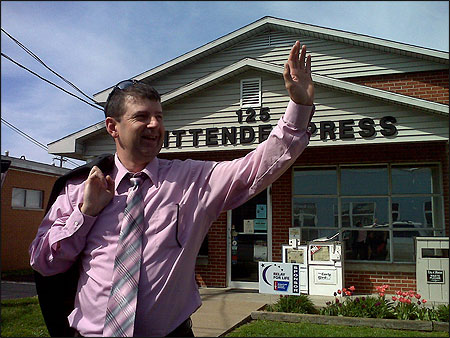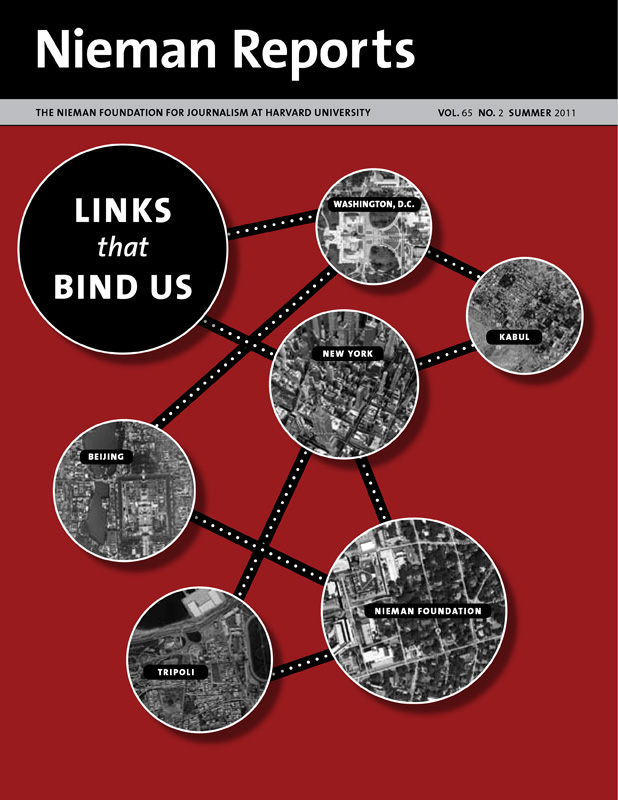
Chris Evans, editor and publisher of The Crittenden Press in rural Kentucky, explains his mission: “We are here to serve the people.” Photo by Allison Mick-Evans.
Lyndon Johnson once observed that "the country weekly acts as a form of social cement in holding the community together." But this son of rural Texas, who rose to be president of the United States, also declared, "The fact that a man is a newspaper reporter is evidence of some flaw of character."
Johnson was a man of some contradiction. These two views, each perhaps held with equal fervor, reflect the constant conundrum that good community journalists confront between responsibilities as a professional and the need to have friends and friendly acquaintances, as part of a community. Holding local leaders and institutions accountable while playing an engaged civic role of building and strengthening the community inevitably leads to conflict.
It's been said that the best thing about community journalism is that you get to write about people you know—and that the worst thing about it is that you get to write about people you know. And even if you don't actually know a person named in an unfavorable story, you had better be ready to defend your work when that person meets you on the street or in the store or shows up at your desk. In community journalism, there is no place to hide, and if you want to hide, then you have no business in this business anyway.
That is why it is more difficult to be a good journalist in a small market than in a large one. Not only must you manage the inherent conflicts almost every day, you must be prepared to defend journalism as an institution—one that needs to act without fear or favor, taking stands on community issues while also providing a fair forum for all points of view. This is best accomplished with a good dose of humility, and not by casually tossing out phrases like "the people's right to know," then pulling up the drawbridge, and retreating into the fortress of an office.
Relationship Journalism
The job of building and maintaining personal relationships is essential to success. Chris Waddle, former editor of The Anniston (Ala.) Star and now teaching at Jacksonville State University in Alabama, is fond of saying that community journalism is "relationship journalism." That means community journalists necessarily have closer and more continuing relationships with subjects and sources, and with readers, listeners or viewers than in a metropolitan area like Louisville, Kentucky, where Chris and I worked.
Does that mean community journalists will pull punches or find ways to rationalize that discretion is the better part of valor? Sure. But over the long haul, even the best community journalists will be guided by both principle and political sense—which comes from an understanding of and a respect for the community.
Here's a good example: Tom and Pat Gish of The Mountain Eagle in Whitesburg, Kentucky crusaded against the abuses of coal companies and feckless or corrupt officials, and befriended visiting journalists—including photographers whose pictures often reflected poorly on the Appalachian community. But the Gishes didn't publish such pictures in the Eagle because maintaining the mutual respect they had with their readers was a key to the couple's ability to keep going for more than 50 years in the face of economic boycotts, personal shunning, and even a firebombing by a local policeman. Today their son Ben edits the paper with the same sensibilities.
Digital Demands
With digital media, community journalism has new challenges, some so fundamental that they are altering the meaning of the word "community." So far, in the one-two punch of digital media and the recession, community newspapers have generally done better than metro and national newspapers. Here are some reasons:
- They have a local news franchise that few competitors have invaded.
- They do not rely as heavily on the classified advertising that Craigslist and other free services chased from metro papers.
- More of them are independently owned, making them less subject to the demands of creditors and Wall Street.
However, digital media are compelling competition and they spawn competing communities—communities of interest, not location. On Facebook and other social media sites, people interact with little or no regard to physical geography, perhaps eroding connections within the local community.
One virtue of Facebook—at least for the purpose of this discussion—is its insistence against anonymity. The ability to remain anonymous appears to encourage contemptuous, antisocial and unethical behavior. Websites such as Topix, which create anonymous, geographic-oriented discussions both reveal and create problems for small towns. Posts on that site about a young woman's personal behavior were blamed for a multiple murder-suicide that wiped out a family in southern Indiana.
Topix CEO Chris Tolles told The Courier-Journal in nearby Louisville, Kentucky: "We are the WikiLeaks for small-town America in a lot of cases," referring to the fact that anonymous posts can serve a role in holding public officials and institutions accountable—especially in places where the news media lack the resources or gumption to do that job. However, that virtue can be quickly subsumed by the accusatory rants, gossip, libel, falsehoods and cyberbullying seen on Topix and similar sites. A social media expert told Courier-Journal reporter Grace Schneider that Topix can be particularly troublesome in small communities where it's easier to pierce the poster's anonymity.
Social media are not intrinsically erosive. Good community journalists—like their peers working in larger regions—use social media to maintain and improve contact with community members and weekly newspapers use Facebook to keep readers up to date on breaking news, sports scores, and other topics of daily community interest.
However, the community bonds in many rural areas are being weakened by the disappearance of jobs, forcing residents into long commutes. Last year at the Institute for Rural Journalism and Community Issues we did a survey with Dr. Elizabeth Hansen of Eastern Kentucky University in Kentucky's Estill and Lee counties. There the average commuting time is 35 minutes, which is 10 minutes more than the national average; our survey found that residents who work outside the county are less likely to read one of the local weekly newspapers.
Many rural weeklies have no website or they have one with little or no news content, for fear of cannibalizing their print circulation that is key to advertising dollars. Some weeklies that once put most of their news online for free now give nonsubscribers just one or two paragraphs of a news story online in the hope that they will buy the print edition or an online subscription.
One of those weeklies is The Crittenden Press, edited and published by Chris Evans, in a county off the beaten path in Western Kentucky. The two-edged digital sword became especially clear to him after a recent drug bust in his community, which prompted false, online rumors of shootings and murder. He countered them with online postings that carried credibility because they were not anonymous, and because people respect him and his newspaper.
"Our task is to be in a position to provide credible information in whatever form people want it in," Evans told me. "You've got to embrace technology, understand where your audience is at, and get there—and the credibility you have will draw people back to you."
Evans got his start at the Post-Intelligencer, a small daily in Paris, Tennessee, about 90 miles south of where he is today. He clearly has the skills for metro journalism, but he wanted to be his own boss in the model of the Williams family that has run the Paris paper for three generations. "We are here to serve people," Evans said, then quoted Bryant Williams, the family patriarch until his death in 2009: "The only higher calling is the ministry."
Al Cross is director of the Institute for Rural Journalism and Community Issues and an associate professor in the School of Journalism and Telecommunications at the University of Kentucky. He was a weekly newspaper editor and manager before he spent 26 years at The (Louisville, Ky.) Courier-Journal, which included a year as president of the Society of Professional Journalists.



